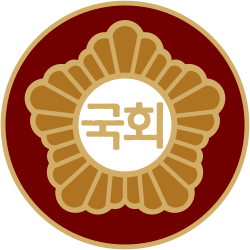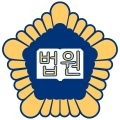South Korean local elections, 2018
|
| ||||||||||||||||||||||||||||||||||||||||||||||||||||||||||||||||||||
| ||||||||||||||||||||||||||||||||||||||||||||||||||||||||||||||||||||
All 17 metropolitan mayors and governors (All 3,977 seats of Provincial and Municipal leaders and Assemblies) | ||||||||||||||||||||||||||||||||||||||||||||||||||||||||||||||||||||
|---|---|---|---|---|---|---|---|---|---|---|---|---|---|---|---|---|---|---|---|---|---|---|---|---|---|---|---|---|---|---|---|---|---|---|---|---|---|---|---|---|---|---|---|---|---|---|---|---|---|---|---|---|---|---|---|---|---|---|---|---|---|---|---|---|---|---|---|---|
| Turnout |
60.2% | |||||||||||||||||||||||||||||||||||||||||||||||||||||||||||||||||||
| ||||||||||||||||||||||||||||||||||||||||||||||||||||||||||||||||||||
 | ||||||||||||||||||||||||||||||||||||||||||||||||||||||||||||||||||||
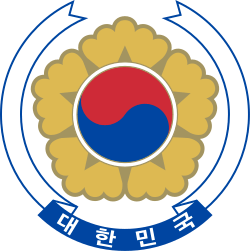 |
|---|
| This article is part of a series on the politics and government of the Republic of Korea |
| Constitution |
|
Judiciary |
The 7th local elections were held in South Korea on 13 June 2018. The election coincided with the by-elections for the vacant seats in the National Assembly.[1]
Candidates
Bold text on the candidate's name indicates that a candidate has won as governor/met. mayor.
| Candidates/Parliamentary Parties | Others | |||||
|---|---|---|---|---|---|---|
| Seoul | Park Won-soon | Kim Moon-soo | Ahn Cheol-soo | Kim Jong-min | Kim Jin-sook (Minjung) In Jie-yeun (Korean Patriots) Sin Jie-ye (Greens) | |
| Busan | Oh Keo-don | Suh Byung-soo | Lee Sung-guen | Park Joo-mi | Lee Jong-hyuk (Independent) | |
| Daegu | Im Dae-yun | Kwon Young-jin | Kim hyung-gi | |||
| Incheon | Park Nam-chun | Yoo Jung-bok | Moon Byung-ho | Kim Eung-ho | ||
| Gwangju | Lee Young-sup | Jeon Duk-young | Na Gyung-che | Yoon Min-ho (Minjung) | ||
| Daejeon | Heo Tae-jung | Park Sung-hyo | Nam Choung-hee | Kim Yoon-gi | ||
| Ulsan | Song Cheol-ho | Kim Ki-hyun | Lee Young-hee | Kim Chang-hyun (Minjung) | ||
| Sejong City | Lee Choon-hee | Song Ae-yong | Hu Chul-hue | |||
| Gyeonggi Province | Lee Jae-myung | Nam Kyung-pil | Kim Yung-hwan | Lee Hong-ue | Hong Seong-gyu (Minjung) | |
| Gangwon Province | Choi Moon-soon | Jung Chang-soo | ||||
| North Chungcheong Province | Lee Si-jong | Park Kyung-guk | Shin Yong-han | |||
| South Chungcheong Province | Yang Seung-jo | Lee In-je | ||||
| North Jeolla Province | Song Ha-jin | Shin Jae-bong | Im Jung-yeop | Kwon Tae-hong | Lee Kwang-seok (Minjung) | |
| South Jeolla Province | Kim Young-rok | Park Mae-ho | Min Young-sam | Noh Hyung-tae | Lee Sung-soo (Minjung) | |
| North Gyeongsang Province | Oe Jung-gi | Lee Cheol-woo | Kwon Oe-eul | Park Chang-ho | Yoo Jae-hi (Korean Patriots) | |
| South Gyeongsang Province | Kim Kyung-Soo | Kim Tae-ho | Kim Yoo-geun | |||
| Jeju | Moon Dae-rim | Kim Bang-hoon | Jang Seong-cheol | Won Hee-ryong (Independent) Ko Eun-young (Greens) |
Results
| DPK : 12,996,529 votes, 51.42% | LKP : 7,017,554 votes, 27.76% | JPK : 2,267,690 votes, 8.97% | BMP : 1,973,141 votes, 7.81% | PDP : 385,202 votes, 1.52% | MJP : 245,477 votes, 0.97% | GPK : 175,988 votes, 0.70% | ↑parties that got more than 5% of the votes |
External links
References
- ↑ "<막 오른 지방선거 레이스>재보선 10곳 이상 내년 지방선거는 거물급'미니총선'". 문화일보. Naver. Retrieved 25 December 2017.
This article is issued from
Wikipedia.
The text is licensed under Creative Commons - Attribution - Sharealike.
Additional terms may apply for the media files.
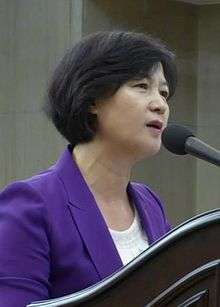
.jpg)
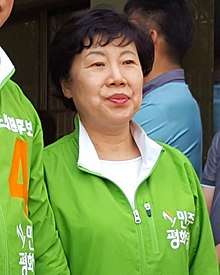
.jpg)

